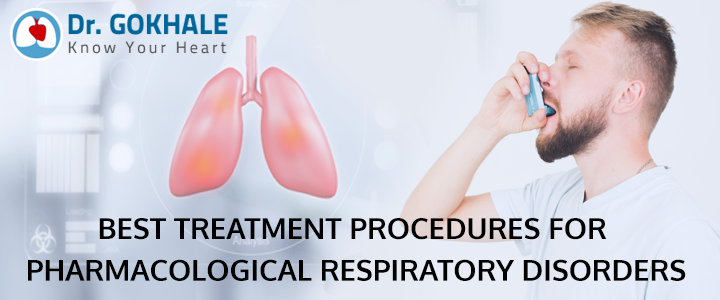- Smoking tobacco
- Infections
- Chained tobacco smoking
- Exposure to other hazardous air pollutants.
Attaining medical assistance from an expert while one faces prolonged issues with cough and breathing is mandatory. Further, early identification of respiratory diseases through tests can help initiate medication and other treatments. Pharmacological respiratory diseases treatment includes inhalers and other medications, while medical practitioners adopt practices like oxygen therapy, inhalation therapies, lung surgeries, and more to treat the condition impactfully.
Pharmacological Treatments
- Bronchodilators
One of the most popularly used inhalers is Bronchodilators, an inhaler that comes with two distinct types of drugs for a short or long-term impact based on the condition. By linking to your body’s nervous system or other systems depending on its type, it pauses the effects and troubles caused by the respiratory disease and relieves your systems for an interval. While short term inhalers provide relief for 4 to 6 hours, long term inhalers last their effect for up to 12 hours.
- Mast Cell Stabilizers
A medication generally used to treat or curb the effects of an infection. By shutting off mast cell degranulation, it controls the discharge of certain channels, which further helps in stabilizing the cell.
- Corticosteroids
An anti-inflammatory medication that aids release inflammation within the blood vessels is also used as a beneficial drug for treating respiratory diseases.
- Antihistamines & Epinephrine
Antihistamines are originally the same composition that Benadryl is made with and serve the same cure. This heals cold, cough, etc, and is taken orally. Epinephrine on the other hand works through injections treating the allergies immediately.
- Leukotriene Receptor Antagonists
A relatively newer medication for diseases like asthma, available for consumption in the form of tablets. Its incredible properties give the mixed benefits of anti-inflammatory and bronchodilators medications.
Treatments By Medical Experts
The role of a pulmonologist is to diagnose the type of respiratory disease and conduct therapies, suggest surgery, or to prescribe effective medications for lung disease treatment. By conducting sessions, the medical practitioner assigns the appropriate amount of dosage for inhalation.
By commencing the treatment with thorough analysis and tests, the specialist concludes with the best of medications. Further, by working closely with surgeons, they layout efficient surgery plans and accomplish better results.
Respiratory system diseases and prevention tips by experts
- Quit Smoking- There is no better solution than quitting the act that has caused them harm. This won’t undo the harm caused but will certainly help stop further damage.
- Avoid cases of chained or second-handed smoking
- Wash your hands often & always follow basic etiquette like covering your mouth while coughing
With that being said, considering renowned medical practitioners like Dr. Gokhale can aid speed up the treatment process. Dr. Gokhale, a Padma Shri award winner has served many with lung transplants and successive treatments to attain good health.
 Ask Doctor
Ask Doctor
